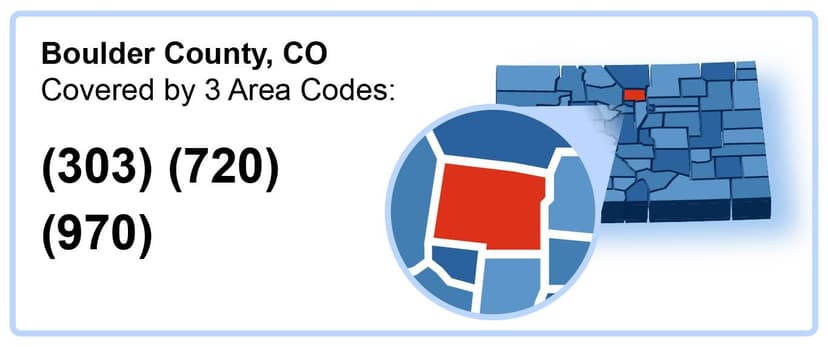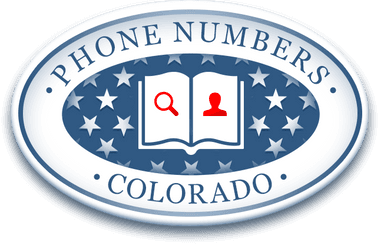What are Boulder County Area Codes?

An area code is a common term for Numbering Plan Area (NPA), which refers to the first three digits that precede every North American phone number. Every county in Colorado has unique area codes that help to identify the origin of phone calls.
Boulder County currently covers three area codes, which also serve parts of neighboring counties. The area codes are:
Area Code 303
Area code 303 covers Boulder County and other parts of North-Central Colorado. This includes Denver, Lakewood, Littleton, Castle Rock, Aurora, and Longmont. Area code 303 is one of the foremost area codes assigned in 1947 and was originally designed to cover the entire State of Colorado. It served that purpose up until 1988 when southeastern Colorado was assigned area code 719. In 1995, Colorado experienced another area code split with northeastern and western Colorado, receiving area code 970. Area code can be spoofed by scammers to carry out all manner of frauds. Residents are encouraged to perform area code lookups whenever they suspect fraudulent calls.
Area Code 720
Area code 720 serves Boulder and Central Colorado, including the larger cities and communities of Brighton, Broomfield, Denver, Castle Rock, Longmont, Loveland, etc. Area code 720 was officially put into service on January 6, 1998. It was originally designed as the overlay for area code 303. An overlay plan is a telephone numbering plan that assigns multiple area codes to a geographic numbering plan area (NPA). It is practiced to prevent the exhaustion of phone numbers and central office codes in growth areas.
Area Code 970
Area code 970 covers most of the Western and Northern parts of Colorado. This includes Aspen, Durango, Fort Collins, Greeley, Loveland, Grand Junction, etc. Area code 970 was established in an area code split from area code 303 on April 2, 1995. Here, only the Denver metropolitan retained area code 303.
What are the Best Cell Phone Plans in Boulder County?
A 2018 National Center of Health Statistics survey estimated that 61.4% of Colorado adults exclusively used wireless telephone services. By contrast, only 3% of Colorado adults used landlines as their preferred telephone service. Also, 16.3% used wireless telephones mostly, while 11.6% used both wireless and landlines. These figures show that cell phones are used more than landlines in Boulder County.
Colorado telephone services are managed by four major carriers - Verizon, AT&T, Sprint, and T-Mobile. Besides these carriers, Colorado is also served by smaller carriers known as Mobile Virtual Network Operators (MVNOs). Sprint has the widest coverage in the state with 88% coverage compared to other phone carriers in the county. T-mobile closely follows with about 86% coverage and Verizon with 78%. AT&T ranks the lowest in terms of coverage strength with 74%.
The use of landlines in Colorado is low compared to other states. Residents are encouraged to use modern telephone services such as VoIP. In Boulder County, several VoIP service providers are willing to provide services for both business and residential users. Residential plans provide some basic features and focus on simple inbound and outbound calling, while the business plans focus on enterprise features such as productivity suites, and answering systems.
What are Boulder County County Phone Scams?
These are scams perpetrated on residents of Boulder County over the telephone. Con artists call and target citizens to steal sensitive information or money from them. Reverse phone number lookup services can help citizens identify such scammers. Residents can perform suspicious phone number lookups on their own or by contacting reverse phone lookup service providers.
What are Unemployment Scams?
In this scam, the caller informs the target of an unemployment benefits claim. There are two ways that citizens are defrauded through the unemployment scam. In the first type, the caller poses as an official of the Colorado Department of Labor and Employment (CLDE). They claim that the call is a response to an unemployment claim that someone else made in the target's name. Scammers may request personal information or financial information, or that funds received in error be transferred to them. In the second type, the caller does not impersonate the CLDE but tries to get sensitive information from the target to file a bogus claim.
Residents do not have to apply for unemployment benefits to fall victim to these scams. A free reverse phone lookup service can identify whether or not the call is from the CLDE. However, con artists can spoof their caller ID information to display the CLDE numbers. Hence, it is advisable to call the CLDE using its official phone numbers to make inquiries.
What are Coronavirus Scams?
In these scams, the callers identify themselves as health workers and attempt to entice their victims to buy bogus testing kits, fake products, or to offer vaccination. Victims are often told to run tests within 48 hours or risk being quarantined. Scammers may even promise the victims investment opportunities if they partner with them. They claim that products or services of publicly traded companies can prevent, detect, or cure coronavirus and that the stock of these companies will increase in value as a result. Residents are to exercise caution anytime unknown callers try to sell products or investment opportunities to them. Phone number search services can tell exactly who called you and whether or not it is a local caller.
What are Background Check Scams?
In this scam, a person is supposedly employed for a job after an interview over the phone, but before the end of the call, the interviewer asks the job seeker to send a prepaid credit card to pay for background checks or training supplies. The interviewer claims that this is required to validate employment. As soon as payment is made, the so-called interviewer will cut off communication with the victim. Residents are encouraged to verify callers before making any form of payment in response to such calls. A reverse phone lookup can answer the question, “who is this number registered to?” Note that legitimate jobs do not ask job seekers for any form of payment.
What are Government Scams?
In these scams, the callers pretentiously claim to be government officials from the Internal Revenue Service or the Social Security Administration. Scammers use fear and threats to defraud innocent individuals. Government scams mostly target international students or immigrants who are not familiar with how these government offices work. Victims are required to make payments immediately or get arrested. The Boulder County Attorney-Consumer Protection Division encourages residents to make inquiries from appropriate offices before making payments in response to such telephone calls. Individuals may use reverse cell phone lookup tools to identify who called them.
What is Romantic Scam
In this scam, the victim meets someone online and there is a romantic connection. After a few visits together, the scammer convinces the victim to undress while the scammer secretly records the entire event. After a while, the scammer calls to inform the victim about the video and threatens to share it publicly if they do not pay up. Residents should inform the police of such cases immediately. The department can conduct a phone number lookup by address to identify where the caller made the call from.
What are Robocalls and Spam Calls?
A robocall is a phone call that is initiated using a computerized autodialer to deliver a pre-recorded message to a selected audience. A robocall is characterized by the voice of a recorded message instead of a live person. Robocalls are often associated with telemarketing sales and political campaigns. However, the public service can use them to report emergencies. Spam calls are unsolicited calls that are distributed in bulk. These calls may be used to sell bogus claims or products. Scammers use robocalls, and spam calls to target victims, pretending to be from legitimate organizations. The pitch of fraudulent robocalls is usually bogus claims to entice victims. These calls are used to retrieve confidential information such as social security numbers, credit card information, etc. from unsuspecting victims. A free reverse phone lookup service can help identify whether a robocall is from a legitimate business.
The best options, if you receive a robocall are to:
- Hang up the call. Do not press any number to speak to a live operator or to remove your number from the list.
- Contact your phone network provider and ask them to block the robocall number.
- Use a phone number lookup tool to identify the caller. An area code lookup can also help identify the origin of a phone call.
- Report illegal robocalls to the FTC online or call 1-888-382-1222.
- Add your number to the National Do Not Call Registry. Inclusion in this registry exempts you from receiving robocalls and other sales calls from telemarketers and businesses. This may not stop unsolicited calls, but it will identify illegal robocalls as possible phone scams.
How Can You Spot and Report Boulder County Phone Scams?
Scammers use several means to defraud unsuspecting persons. Residents can combat scams only when they have the right information and are vigilant. Indications that phone calls are scams include:
- The use of aggressive persuasion to coerce victims into revealing sensitive information. Scammers often use threats of arrest, fines, suspension, audits, or withdrawal of licenses. Residents may use any free reverse phone number lookup service to verify who called them.
- Ridiculous investment opportunities, deals, and offers. Fraudsters use bogus claims and promises to entice or distract victims from carefully scrutinizing the calls.
- Calls from supposed government agencies requiring individuals to provide information that the agency is supposed to have.
- The scammers provide instructions on how the payments must be made. Most times, the scammers instruct that the victims must make payment via gift cards, bitcoins, and wire transfers. Note that these payment methods are untraceable. It is important to perform number lookups before considering paying anyone.
Tools like reverse phone lookup services can help identify potential phone scams. Residents can use either free phone number lookup by name or phone number lookup by address services. Public institutions in Boulder County are committed to fighting the menace of phone scams in the area. These are:
Boulder County State's Attorney Consumer Protection Division - The consumer protection division provides information on new scam tricks in the state. The Unit maintains a consumer fraud line, (303) 441-370, that handles public inquiries on consumer matters.
Boulder County Sheriff's Office - Provides updates and information about common scams in the county. Residents of Boulder County who have received phone calls from suspected scammers can report to the Sheriff's Office or the Boulder Police Department in the district. The department may assist victims with reverse phone number look ups to find fraudsters.
Better Business Bureau - The Better Business Bureau is the source of information on legitimate business entities registered in Boulder County. The BBB also provides information about phone scams in Boulder County. Residents can contact the BBB on (303) 758-2100.
Federal Trade Commission - The FTC protects consumers from deceptive and fraudulent practices. The FTC initiated the National Do Not Call Registry as part of its efforts to eliminate unwanted calls. If you added your number to the DNC register but still receive unsolicited calls, the calls are most likely scam calls.
